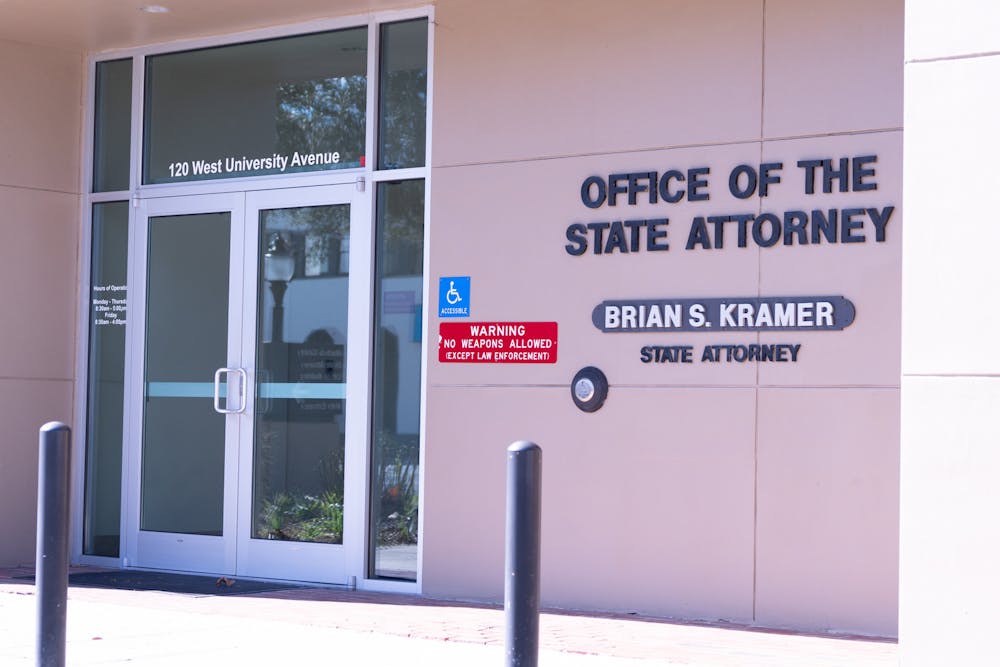Nestled inside a discreet former bank in downtown Gainesville, the State Attorney’s Office handles a wide range of cases, from high-profile murders to traffic tickets and everything in between.
The 8th Judicial Circuit covers an area of 3,700 square miles that includes Alachua, Baker, Bradford, Gilchrist, Levy and Union counties. State Attorney Brian Kramer, Gainesville’s top law enforcement official, supervises a staff of 130 employees who collectively process 18,000 cases each year.
Kramer sat down with The Alligator to provide an inside look into the criminal justice system in Gainesville.
The job
Kramer wasn’t always involved in the prosecution side of the system. He started as an assistant public defender in 1993 after being turned down for an internship with the State Attorney’s Office. After nearly three years, one particular case drove Kramer to jump back into criminal prosecution.
A young woman with a 1-year-old child he represented faced a minimum 15-year sentence for a drug-related crime. He went to the prosecutor’s office to make a last-minute plea for a lenient sentence.
“I'm sitting outside of his office, waiting to go in and make my plea for this woman, and it just occurs to me how long I'm going to be in this business,” he said. “That I want to be the person who's making that decision. Not the person who's asking.”
Kramer believes working as a public defender helped him gain valuable life experience and a fresh perspective he can apply to the high-stakes decisions a prosecutor naturally faces. It also guides his hiring decisions, he said.
“Wouldn't government be better if we had the most skilled, most ethical people with the best judgment working to make the decisions that affect people's lives? That's what I strive for when I'm hiring people,” Kramer said.
However, attracting new attorneys to the field of criminal prosecution, widely regarded as demanding, stressful and emotionally exhausting, is especially difficult.
Lawyers working at large transactional law firms can earn up to $245,000 in their first year out of law school. Prosecutors in Gainesville, who typically handle 150 cases at one time, only earn around $60,000.
Sarah Wolking, a senior legal skills professor and director of the prosecution clinic at UF Levin College of Law, has personally seen the effects of the profession’s low salary.
“The disparity is so huge that it makes it really difficult to retain prosecutors. It's hard to recruit people for half the pay,” she said.
Wolking manages the prosecution clinic at UF Law, which integrates classroom instruction with hands-on internship experience in Kramer’s office. One former student, who worked as a prosecutor in Jacksonville, handled 400 felony cases at one time. The workload, stress and low pay caused her to leave for private practice.
“What's happening when you have that many cases? You're working nights, you're working weekends, and many law students are like, ‘It's not worth it. It's not worth that time investment,’” Wolking said.
According to a study by the American Bar Association, 28% of lawyers struggle with depression, while nearly 12% reported having suicidal thoughts, much higher than the national average.
“I think anybody actually involved in the criminal justice system has probably, at some point or another, experienced vicarious trauma. Now we're much more informed about the toll that vicarious trauma takes on people and we're much more trauma informed. We still have a long way to go,” Wolking said.
Last year, Kramer tried convincing the Florida Legislature to increase public sector starting salaries to $75,000, which he hoped would slow his office’s nearly 30% turnover rate. Both Kramer and 8th Circuit Public Defender Stacy Scott pitched their proposal to the Alachua County Legislative Delegation.
Although the pay is low, the UF Levin College of Law aids recruitment efforts as current students seek internships and recent graduates seek employment. This makes hiring in the 8th Circuit slightly less challenging than other rural areas of the state, Kramer said.
“The University of Florida is really a huge benefit to our office,” he said, “You want to prosecute? We're the only game in town.”
Although many enjoy the challenges of working in the criminal justice system, exposure to violence is part of the job description, Kramer said. In recent years, there’s been growing recognition of the job’s potential harmful effects.
“It can be very dehumanizing. People shouldn't be okay with looking at the destruction of another human being, and just being like, ‘Okay, this is another day at work,’” he said.
Prosecutors nationwide are now using various strategies to better manage the emotional toll of their cases.
“We have an open line of communication with all of our lawyers to say, ‘Do you feel like you shouldn't be doing this kind of case anymore? Or maybe you need a break?’” Kramer said. “There's no consequence for that. It's not a bad thing.”
Because Kramer is an elected official, his job is different from those of the attorneys under his command. He manages a $12 million budget and a support staff that includes investigators, attorneys, victim advocates, accountants, electronic data processing and clerical staff, which he considers his “army.”
He still occasionally handles cases like a regular attorney, but with one important distinction: they’re all death penalty trials. Only Kramer himself is authorized to sign the notice of intent to seek the death penalty, making it the sole document exclusive to his signature.
“If I'm going to ask the citizens of this community to authorize the taking of another citizen's life, I need to do that myself. It will be done at the highest level of ethics,” he said.
Crime trends
A 2023 report by the Gainesville Police Department revealed an alarming 20% rise in overall crime compared to 2022, something Kramer acknowledges seeing firsthand since assuming office.
“We are seeing more violent crime in the city of Gainesville and the urban population of Gainesville,” he said.
Kramer attributes this to staffing shortages across the Alachua County Sheriff’s Office and a historical lack of city commission support for police officers in Gainesville, which has affected officer morale and recruitment. At its peak, the sheriff's office had 250 vacant positions, approximately 26% of the workforce.
Less enforcement creates a situation where the costs of committing crime are low, while the benefits are high.
“Whole areas of enforcement went away: drug enforcement and gang enforcement. The people who commit the most serious crimes have recognized that enforcement is significantly down,” Kramer said.
ACSO Sheriff Emery Gainey has made progress in the attempt to retain deputies and support staff, said ACSO Spokesperson Arthur Forgey.
“Since taking office, Sheriff Gainey has been able to reduce those numbers, hiring around 100 people. The office continues to have staffing shortages and Sheriff Gainey has instituted a recruiting team that is traveling and recruiting potential candidates,” Forgey said.
The sheriff’s office also disagrees that staffing issues are contributing to an overall rise in crime. Records obtained by The Alligator show jail bookings and calls for service have increased in recent years, but so has the county population.
“While staffing may or may not play a small part in the overall crime picture, there is no way to draw a direct correlation to staffing and crime. There are many different factors to consider when looking at an increase in criminality, such as mental health, [the] economy, socioeconomic status, COVID-19, etc.,” Forgey said.
Overall, Kramer prides himself on seeing the people stuck within the criminal justice system through an empathetic lens.
“You need to always be aware of what you're doing to someone else and making sure that it is appropriate to the crime that you're dealing with,” Kramer said. “She stole diapers and grapes, and she should be punished, but should the punishment be that she loses custody of a child? And the answer, of course, for me, is no.”
Contact Daniel Bednar at dbednar@alligator.org. Follow him on X @Danielbednar5.
Daniel Bednar is the City & County Commission reporter and a second-year political science major. He previously worked as the crime reporter. When he's not writing, you can find him driving a motorcycle or flying an airplane.






